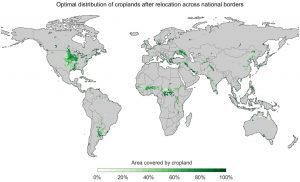The agricultural-food system (agri-food for short) has become a dominating industry for the human species. About 38% of the Earth’s land surface used for crops and pastures for cattle. Unsurprisingly, this has created some serious environmental implications that we should all be aware of (United Nations, 2020). According to a 2019 study from the Food and Agriculture Organization, the universal agri-food system accounted for 31% of greenhouse gas emissions (GHG). This accounts for food processing, packaging, transport, household consumption, and waste disposal (Food and Agriculture Organization, 2020). These greenhouse gases contribute to climate change. Meanwhile, this sector is only expected to grow and actually surpass the other heavy-emission producing industries such as transportation and electricity. Cropland relocation may be a solution.
The Current State of Agriculture
Our food system also poses a threat to nearly 86% of all species currently facing extinction. Habitats and ecosystems are demolished to make room for Big Burger and other agricultural ventures. A lack of biodiversity isn’t good for anyone. The planet has evolved in such a way to integrate every life form into intricate food webs and systems, and without sufficient replacements a lot of Earth’s life support systems will be thrown out of balance. Also, the fact this data exists proves that the current model of agriculture is inefficient.
Ideally, we could improve agriculture in a way that would reduce costs, both economic and environmental. In addition to the potential for species extinction, agriculture places heavy constraints on our water supply. Overall, seventy percent of global water consumption is used in one form or another for crop irrigation (OECD, 2017). Farmers in the future will face the threat of competing water-use supply as urban cities are projected to increase in the coming years, increasing their demand on the world’s most valuable resource.
Cropland Relocation As A Solution
Clearly, the way we grow food is taxing to the planet, its species, and our own sustainability. Unless we figure out a way to become more efficient in terms of maximizing harm reduction, we are going to be in a world of pain in the years to come. Luckily, there is some light at the end of the tunnel. Now, a new study offers a sliver of hope during a time of global uncertainty. The paper proposed that if agricultural lands were moved to the green zones demonstrated below we could maintain the same amount of food production while significantly reducing CO2 emissions, biodiversity loss, and water consumption.

"Optimal distribution of croplands after relocation with national borders" Credit: University of Cambridge
"Optimal distribution of croplands after relocation with national borders" Credit: University of Cambridge
Cropland Relocation Study Methodology
The researchers took into account the 25 most produced crops in the world and adjusted the map to account for current and future climatic weather conditions to provide reliable and consistent data. Then, the team of researchers from the University of Cambridge discovered that there were optimal locations for crop production. Specifically, these locations provide consistent rainfall, eliminating the need for irrigation systems by nearly 99%, while simultaneously reducing carbon and biodiversity impacts by 71% and 87%, respectively (Beyer et al., 2022).
Once relocated, the previous cropland would be protected and allowed to regenerate to its original state. This would create new carbon stores to offset previous emissions. Relocation would also reduce the presence of croplands in tropical biomes by 98%. This would allow rich ecosystems to be restored and recreating habitats for endangered species. Change in farming technique would work with nature instead of against it, reducing the physical imprint of monoculture (farming a single crop in large areas) bringing Earth’s species back into the picture.
Other Ways To Reduce CO2 Emissions
Local organizations like IDEAS for Us have already known that the agricultural industry produces many inefficiencies and costs to the environment and they have been working on projects to tackle such issues. The non-profit created Fleet Farming, an urban agriculture program that makes use of unused lawns and properties to generate sustainable gardens for communities. A large part of the programs philosophy is that access to food doesn’t have to be limited to corporations or factory farms. In fact, food can be grown right from your home. Together, the power of knowledge and the respect for natural systems that is ingrained within IDEAS, foreshadows the greater need for more collaborative and efficient food systems that work for every one, every species, and every future.
Conclusion
Obviously the biggest limitations to these plans lie in the socio-political and economical implications that a mass cropland relocation would require, especially since many of these zones cross international borders. However, the fact that this new data exists gives tremendous hope and potential for future generations of activists to shape a world where sustainability and efficiency dominate the conversation. Check out the link to the original paper, I highly recommend you read it for yourself.
Works Cited:
Beyer, R. M., Hua, F., Martin, P. A., Manica, A., & Rademacher, T. (2022, March 10). Relocating croplands could drastically reduce the environmental impacts of global food production. Nature News. Retrieved March 11, 2022, from https://www.nature.com/articles/s43247-022-00360-6#citeas
Nations, U. (2020). Land Use in Agriculture by the Numbers. Food and Agriculture Organization of the United Nations. Retrieved March 11, 2022, from https://www.fao.org/sustainability/news/detail/en/c/1274219/#:~:text=Global%20trends,and%20pastures
OECD. (2017). Managing water sustainably is key to the future of food and agriculture. OECD. Retrieved March 11, 2022, from https://www.oecd.org/agriculture/topics/water-and-agriculture/








